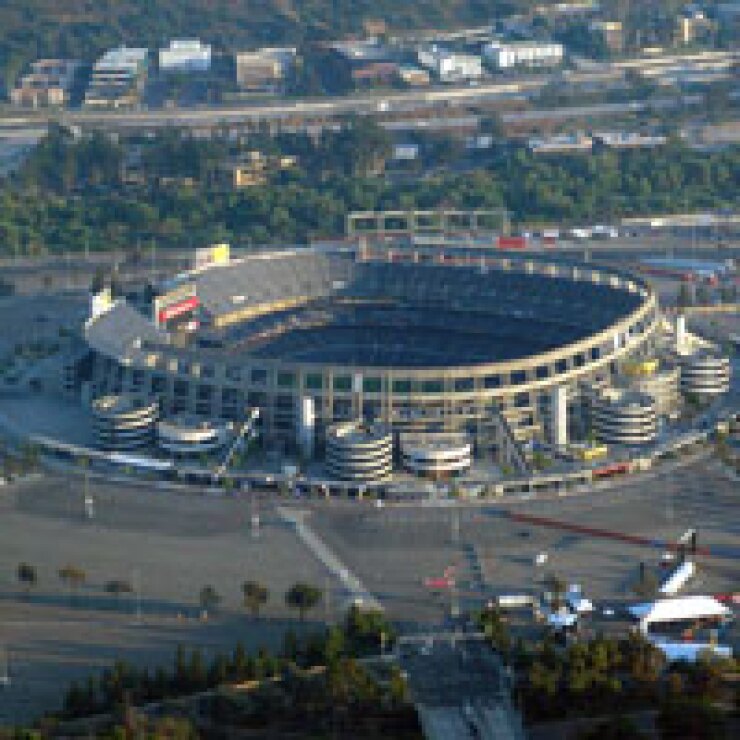
SAN DIEGO – The San Diego Chargers have proposed a financing plan for a $1.8 billion joint use stadium-convention center in downtown San Diego that includes the issuance of $1.15 billion of tax-exempt bonds backed by a hike in the city's hotel tax.
The team outlined the plan in a 110-page report issued on Wednesday, about a week after Rep. Steve Russell, R-Okla., introduced a bill in the U.S. House of Representatives that would prohibit the use of tax-exempt bonds to build or subsidize professional sports stadiums and for-profit entertainment arenas. The bill is in line with President Obama's proposals, in his fiscal 2016 and fiscal 2017 budgets, to prohibit tax-exempt bonds from being used to finance private sports facilities by changing federal tax law.
In its report, the Chargers proposed raising the city's existing hotel, or transient occupancy, tax to 16.5% from 12.5%. The team said the city would issue $350 million of tax-exempt bonds backed by the new tax revenues toward stadium construction and another $800 million of bonds to finance the acquisition of land for the convention center expansion and its construction. The Chargers would contribute $650 million and the National Football League $300 million. The city would not be responsible for any construction cost overruns, according to the plan.
The team released the proposal as a "Citizens' Initiative" because it would need 66,477 signatures from San Diego voters by mid-June to make it onto the November ballot.
A court is expected to decide before November whether the vote, if it takes place, will be decided by simple majority or two-thirds supermajority.
"We believe this is a great opportunity for the community to come together and create something special: an iconic, modern multi-purpose venue while also supporting and expanding our tourism and convention industries," Chargers Chairman Dean Spanos said Wednesday.
In a statement issued the same day, San Diego Mayor Kevin Faulconer, who has long pushed to keep the Chargers in the city, threw his support behind this latest plan, continuing a saga that dates back nearly ten years when the team was first eligible to break its current lease at Qualcomm Stadium.
The new stadium would be located in the East Village neighborhood within eyeshot of Petco Park, which hosts the Major League Baseball's San Diego Padres.
"After more than a decade, the Chargers are putting forward a plan of their own and San Diegans may finally have the ultimate say on a new stadium in November," Faulconer said. "The convention center element makes this proposal more than a stadium and the long term future of San Diego's tourism economy is now intertwined in this plan."
The proposed subsidizing of the stadium costs with visitor dollars was quickly met with resistance from several local officials who warned the bump in hotel taxes could deter tourists. Nearby tourist destinations, including Los Angeles and Anaheim, have lodging tax rates of 15.5% and 17%.
"Once again, it appears the Chargers have chosen the path of most resistance," San Diego Councilman Scott Sherman said. "At first glance, I am not encouraged."
Fellow city councilman Todd Gloria said, "Ultimately, professional football is a private business and voters should consider the Chargers' stadium plan accordingly."
The Chargers currently play their home games at Qualcomm Stadium, a 70,600-seat venue in the Mission Valley neighborhood. Built in 1967, it is the fourth-oldest stadium currently in use by an NFL franchise. Owned and operated by the City of San Diego, it has been criticized for its deteriorating structure and outdated amenities.
The team has also struggled to attract crowds in recent years, most recently finishing 21st out of 32 NFL teams in average home attendance last season.
The offseason has been filled with questions and concerns over the Chargers' future, which were partly quelled with Spanos' announcement in January that the team would continue to play home games at Qualcomm Stadium in San Diego through the 2016 season.
This latest proposal follows several earlier plans that failed to move forward. An unsuccessful plan introduced by a mayoral committee last May called for a $1.1 billion stadium that would have included $173 million of bonds to help finance construction, $121 million from the city, and $121 million from the county, according to the Los Angeles Times. That plan did not include any tax increase. The team nixed that plan in June.
Plans to renovate Qualcomm Stadium for hundreds of millions of dollars have also been floated, but those were deemed impractical relative to the cost of a new stadium.
The proposal is a departure from a previous plan for the Chargers to share a $1.7 billion new stadium with the rival Oakland Raiders in Carson, Calif. That plan was put on hold for 2016. The Raiders and their owner Mark Davis have since expressed interest in relocating to a proposed $1.2 billion stadium in Las Vegas, one that would not be completed until at least 2018.
The former St. Louis Rams in January announced their relocation to Los Angeles before the 2016 season, where they will play their home games at Los Angeles Memorial Coliseum until an estimated $2.6 billion stadium, which would make it the world's most expensive, is completed prior to 2019.





